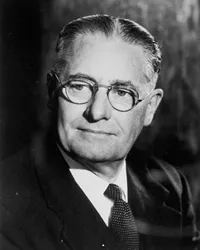Sir Howard Florey
Sir Howard Florey, an Australian Nobel laureate and esteemed medical scientist, played a crucial role in the discovery and development of penicillin, revolutionizing medical science and saving millions of lives

Sir Howard Florey, later Lord Florey, one of Australia's Nobel laureates who became a medical scientist of great intenational reputation, was born and educated in Adelaide, before becoming the South Australian Rhodes Scholar for 1921 at Oxford University in Britain.
In a distinguished academic career, he studied and worked in Oxford, Cambridge, London and Sheffield, as well as in Europe and America, before he was appointed to the chair of the Sir William Dunn School of Pathology at Oxford University in 1935. Though Florey was rightly acclaimed for his achievements in many areas of research, and was rewarded accordingly, it was for his role as the leader of the team of scientists who discovered and developed the therapeutic power of penicillin that he was most celebrated. Lord Florey served as academic adviser to ANU and Chancellor from 1965-68. He shared the 1945 Nobel Prize for Physiology or Medicine for the discovery of penicillin. As the result of Florey's work and the work of his colleagues, penicillin was available to treat Allied troops during the last years of the second world war, and has since revolutionised medical science, saving millions of lives in the process.
Florey and his team often worked in straitened circumstances, with funding and equipment frequently in short supply, but they saw their product through from a scarce and very impure brown powder to the extensive commercial production and distribution of a purified and stunningly powerful antibiotic in a few short years. Florey also played a crucial part in the initiation and development of the Australian National University (ANU) in Canberra, established in 1946, and in the creation of the John Curtin School of Medical Research, opened in 1958, both organisations that quickly became centres of excellence.
Florey also gave his name to another outstanding research organisation, the Florey Institute of Experimental Physiology and Medicine in Melbourne. The first Australian elected to the prestigious position of President of the Royal Society (1960), Florey was knighted in 1944, and accepted the chancellorship of the ANU and a life peerage in 1965, becoming Howard Walter Baron Florey, of Adelaide and Marston. He was provost of Queen's College, Oxford, from 1962 until he died in 1968. (Text originally provided by the Florey Centenary Committee, 1998)
